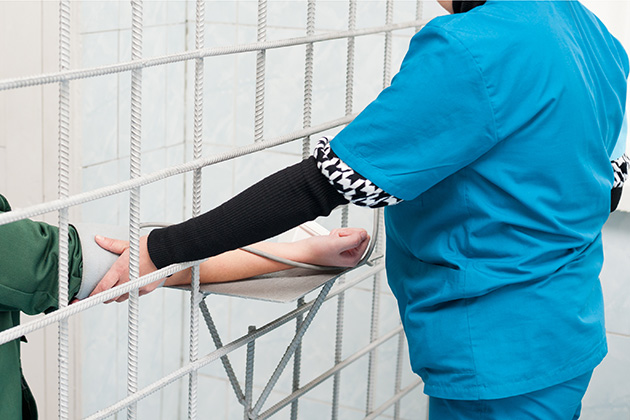UConn has recently established a new collaboration to improve health care for a vulnerable population with complex medical issues.
The Center for Correctional Health Networks (CCHNet) is the first national center to focus solely on correctional health with an inter-professional and practice-based network approach, according to Deborah Shelton, a professor in the School of Nursing and CCHNet’s director.
Under its umbrella, students with majors as diverse as psychology, sociology, and pharmacy, as well as nursing and medicine, can develop ideas designed to facilitate the delivery of health care to the correctional population, while also exploring some of the other societal issues relevant to mass incarceration.
“In the past, when we’ve talked about teamwork in the medical field, it’s largely been about cooperation between doctors and nurses,” says Annette Maruca, an experienced psychiatric nurse who is an assistant clinical professor in the School of Nursing.
“But with the Center, we’re talking about cooperation on a much broader scale. I really think that some of the barriers that have existed are turning into bridges, because this collaboration extends to pharmacists and psychologists and social workers and beyond – all working together to see what we can do to bring care to a vulnerable population with complex problems.”
An expanding population

The United States now holds more than two million people behind bars. This total is unmatched by any other nation on earth in sheer numbers and in per capita rate of incarceration, says Shelton.
This ever-increasing prison and jail population is largely due to changes in sentencing law and policy rather than an increase in crime rate, she adds, and many of those who are confined suffer from the long-term effects of poverty, addiction, and mental illness.
Regardless of why they are incarcerated, Shelton says, individuals in the corrections system need all the medical care required by the population at large, and sometimes more so.
“The correctional system should be about more than incarceration, it should be about rehabilitation,” she says. “The Center is all about filling the gaps in the care of the people who are in this system, most of whom are poor and disenfranchised. Our hope is to improve research, education, and practice programs while delivering innovative health care, and also to develop effective health practices and policies.”
CCHNet, which held its formal opening ceremony in October, connects the schools of Nursing, Medicine, and Pharmacy, with the support the University’s Human Rights Institute and the Connecticut Department of Correction.
While the School of Nursing has been preparing students to work in correctional nursing under a public-academic partnership with the Connecticut Department of Correction for the past 10 years, Shelton says that CCHNet takes the commitment even further.
Denise Panosky, associate clinical professor and a Certified Correctional Health Professional, cites Alyssa Zabin ’16 (CLAS) as an example of the type of student the new center hopes to attract. Zabin is an honors student with a double major in psychology and sociology. She has a particular interest in stress management, and is working with Panosky on a grant helping to reduce stress among correctional nurses. Zabin is looking specifically at how correctional nurses handle the pressures of their jobs, as opposed to nurses who work in other areas of the healthcare system.
“When I first heard about the center, I thought it might offer some great possibilities for interdisciplinary research,” Zabin says. “So far, this has been a great experience.”
Not only has Zabin presented her work at the Frontiers in Undergraduate Research poster exhibition, she and Panosky were awarded a SHARE grant (Social Sciences, Humanities, and Arts Research Experience awards) last spring that enabled them to work jointly on issues specific to stress experienced by correctional nurses.
Maruca, psychiatric nurse and assistant clinical professor, wrote her Ph.D. dissertation on ‘booster intervention’ in a correctional setting. Her research involved ways to reduce the number of group counseling sessions required of incarcerated persons during the transitional phase that prepares them for release. This in turn invites participation by psychologists, social workers, and others who are interested in ways of reducing recidivism among this population.
Says Shelton, “The fact that UConn is willing to take a leadership position with CCHNet speaks volumes about our interest in ‘real life’ problem solving.”




